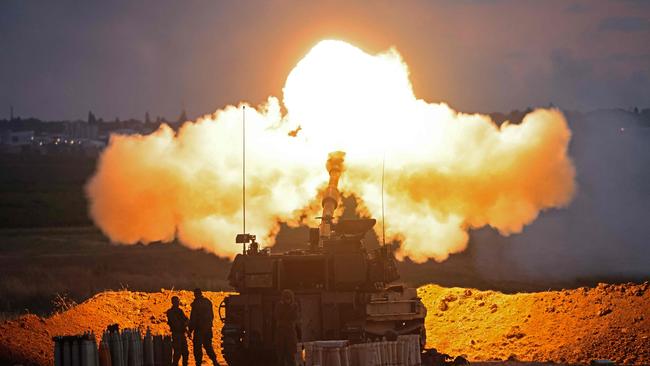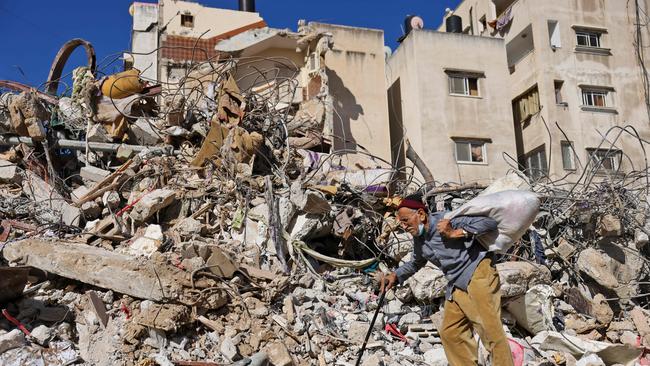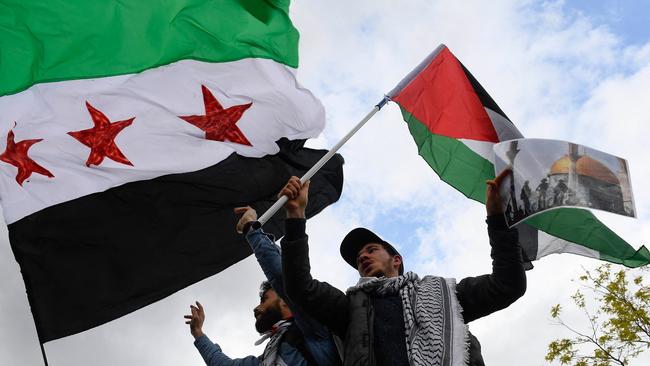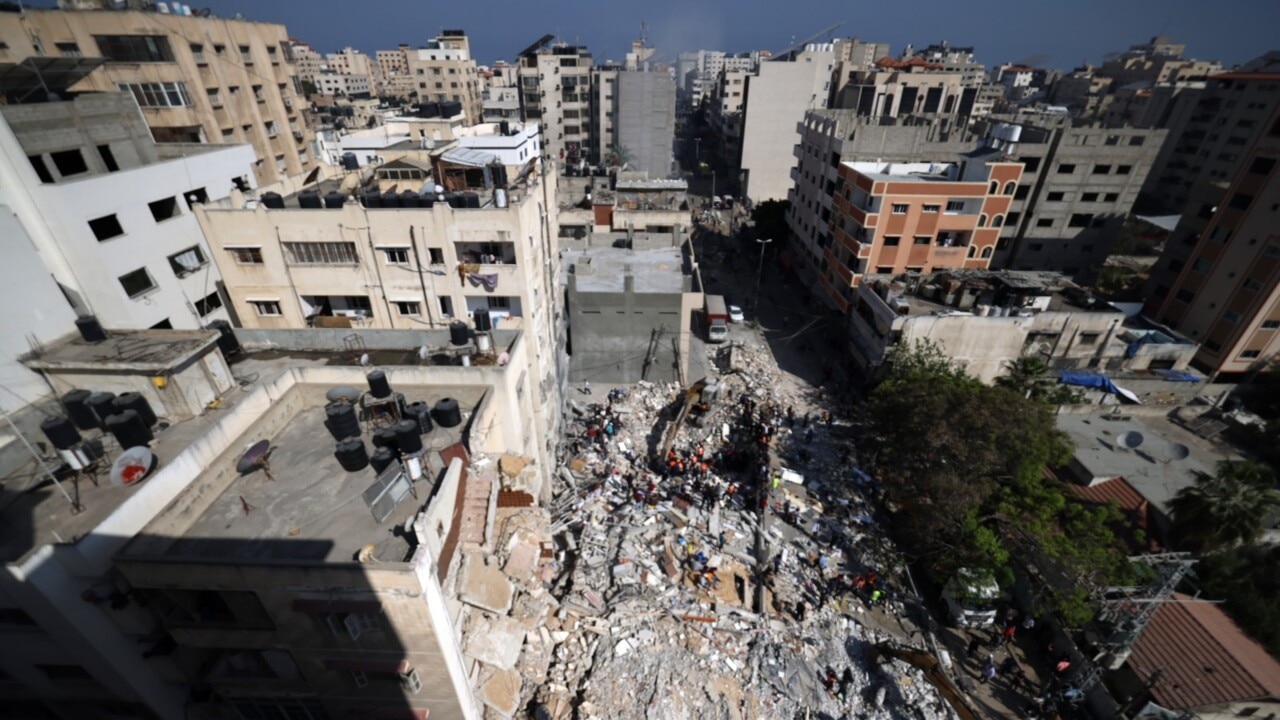Hamas plays bloody politics but Iran is the puppetmaster
The Gaza ceasefire brings no real hope of peace while so many remain intent on Israel’s demise.

This iteration of the conflict ran for 11 days. Some 230 Palestinians were killed and 12 people in Israel died. Those figures are bad enough. But beyond them lie a shocking toll of distress, trauma, injury, crippled and endangered infrastructure, although the death toll was much lower than earlier episodes.
The moral responsibility for the conflict rests with Hamas. It initiated the military engagement and fired 4000 rockets at Israel, almost every one intended to hit a civilian target.
As US Secretary of State Antony Blinken commented, there is, “a very clear distinction between a terrorist organisation, Hamas, that is indiscriminately raining down rockets targeting civilians, and Israel’s response defending itself”.
US President Joe Biden, although he was pushing hard for a ceasefire towards the end, repeatedly propounded Israel’s right to defend itself, as did Prime Minister Scott Morrison.
These democratic political leaders are, as usual, way ahead of the commentator class that instantly reached for the box of ready cliches to call it part of the “cycle of violence”, as though Hamas’ calculated, rational, if utterly ruthless, decision to attack Israel was some kind of natural phenomenon. And as though there is an easy equivalence between an organisation defined as a terrorist organisation under Australian law, and similarly under American and European law, and a democratically elected government.
There is a legitimate debate about the proportionality of the Israeli response. There is no serious debate about Israel’s right to defend itself as any nation would if similarly attacked.
Egypt brokered the ceasefire and Egypt is generally a constructive element in Palestinian politics.
But the biggest outside influence was Iran, and in the short term the biggest winner was probably Israel’s Prime Minister, Benjamin Netanyahu. Two of the core tenets of his leadership — that national security is the most important consideration for an Israeli government, and that there is no credible peace partner for Israel on the Palestinian side — were reinforced.
This conflict has not transformed the Israel-Palestinian equation. But it has changed quite a lot. Hamas can feel, given that it is indifferent to the cost endured by its own people, that it achieved a lot of its objectives. It did not achieve everything it wanted. But in significant ways it damaged Israel, enhanced its own position and, critically, served the interests of the power to which it is loyal, Iran.
Far from being just the latest episode in the “cycle of violence” — as though the Middle East were a dark version of a Disney cartoon — this was a specific military and political campaign, launched by Hamas with a clear-eyed understanding of what would happen, for specific political, military and geo-strategic purposes.
Hamas had ambitions and purposes across Palestinian politics, Israeli society, Iranian regional imperatives and Israel’s international standing. It made some progress in its ambitions in all these areas, although it is also fair to say that Israel held its ground in some matters better than one might have expected.

The disputes in Jerusalem, which were the notional cause of Hamas’ actions, were a ridiculous pretext. Rarely has a more trivial issue been used to justify massive loss of life. It’s worth going through it a little to get the sequence and context.
When the United Nations formed Israel and Palestine in 1947, all of Israel’s neighbours tried to invade it, slaughter the Jews and strangle the state at birth. They were unsuccessful. As a result, many Palestinians fled their homes in what became Israel, and some Jews were slaughtered or fled their homes in previously Jewish neighbourhoods in areas that were conquered by Jordan.
It’s also worth noting that about a million Jews fled pogroms and other persecutions across the Arab world, forced out of properties worth cumulatively hundreds of millions of dollars, which of course they could never reclaim or receive compensation for.
In 1967, Israel’s Arab neighbours launched another attempted war of annihilation against the Jewish state and in the course of this war Israel took control of the West Bank and Gaza Strip.
Sheikh Jarrah is a middle-class neighbourhood in East Jerusalem that encompasses an old Jewish neighbourhood. All the Jewish-owned properties for which Jordan had transferred title to Arab owners have been left in Arab ownership by Israel. Those few properties where title was not transferred remain legally owned by their Jewish owners. In some cases, their ancestors had bought the properties in the 1870s.
The Israeli courts decided that they would not forcibly transfer ownership from the Jewish owners but the Palestinians living there would be defined as “protected tenants” and not required to leave. They would be required to pay a very small rent. The refusal to pay this rent is the only ground on which they can be removed from the property.
Not for any economic reason, but purely as a matter of principle, the Palestinian tenants, across six families, have long refused to pay rent. The case has been winding its way through the Israeli judicial system literally for decades.
Even if you think the Palestinian tenants should be given ownership of these properties, their potential eviction does not constitute “ethnic cleansing”, as hysterically claimed in a good deal of Western media. Further, East Jerusalem Palestinians are eligible to apply for Israeli citizenship. In the past thousands took this up. These days a Palestinian who takes out Israeli citizenship, or sells property to a Jewish Israeli, will be persecuted by extremists.

However, this must be the only case in human history of alleged ethnic cleansing in which the people allegedly being cleansed were offered full citizenship in the state doing the cleansing.
In any event, the minuscule property dispute in Sheikh Jarrah, combined with a bit of the usual argy-bargy that goes on all the time in Jerusalem, Hamas claimed was the cause of launching 4000 rockets against Israeli civilians.
This is completely implausible. But there is another Palestinian political context. Mahmoud Abbas, the Palestinian president, is in his 17th year of a four-year term. His party, Fatah, is factionalised, ageing and unpopular. He was due to hold elections for the Palestinian Authority. There was every chance his party would lose to the much more disciplined, motivated Hamas. So he used as a pretext for indefinitely postponing the election the idea that the Israelis had not made sufficient provision for Palestinians in East Jerusalem to vote.
Hamas is intensely aware of the PA’s weakness. Hamas’ own administration of Gaza has been utterly wretched. The Economist magazine, no friend of Israel by any stretch of the imagination, and with considerable understatement, describes Hamas as “corrupt and authoritarian”, and widely as seen as such by the two million Palestinians unfortunate enough to live under its rule.

By launching an assault against Israel, on a Jerusalem pretext, Hamas was challenging the Palestinian Authority’s grip on West Bank and East Jerusalem Palestinians. It was also doing what extreme revolutionary groups always do — establishing its moral and political bona fides through blood sacrifice. It was being the most militantly anti-Israel force.
The offensive certainly discombobulated the PA, so Hamas has probably had some success in its ambitions within Palestinian politics. The Hamas offensive also had real success in damaging Israeli society and politics.
Before the offensive, the Ra’am Muslim party, which represents some of the Israeli Arab voters — about 20 per cent of Israelis are Arabs — was on the brink of joining an anti-Netanyahu coalition government led by the centrist, Yair Lapid.
This would have been the first time an Arab party participated in an Israeli government. It would have been a huge step forward for Arab integration into Israeli society. Over decades of visiting Israel, I have interviewed many Israeli Arabs. They always have a full range of perfectly legitimate complaints about the government, but I am always struck by what good, democratic, legitimate complaints they are. They want more money for schools, more recognition for minority languages, etc.
Typically, they want a fuller share of Israeli national life. I have never met any of them who want to end Israeli national life.
Generally, they keep away from the politics of the Palestinians in the West Bank and Gaza. This time, some Israeli Jews and Israeli Arabs turned on each other in ugly, horrible street clashes. The police were slow. Jewish Israelis attacked Arab Israelis. Arab Israelis attacked Jewish Israelis. And the idea of the Arab party participating in the Israeli national government collapsed. At every level, these are terrible developments for Israel. They shouldn’t be overstated. The clashes were isolated and condemned by Jewish and Arab leaders alike. But they are a grievous and ominous development.
Hamas also had some success in advancing the interests of its patron, Iran. Many Hamas leaders have said they wouldn’t have anything like the thousands of rockets they have without Iran’s support. Similarly, Iranian leaders have confirmed that support and pledged their assistance to the Palestinians.
This has been technically and politically very clever. Israel and Egypt both control Gaza’s borders as strongly as they can to prevent weapons being smuggled in. But there is an extensive network of Hamas tunnels and a good deal of leakage. This conflict showed Hamas using bigger, more deadly and much longer-range missiles than ever before. What the Iranians have done is transfer missile manufacturing capability to Gaza. In decentralised and often underground facilities, and in facilities located in schools and hospitals and other very hard-to-hit locations, Hamas makes missiles, some of which now can travel 250km and carry 250kg bomb loads.
Israel’s magnificent Iron Dome missile defence system was still effective in knocking out 90 per cent of incoming missiles. But this attack on Israel was a punishment by Iran of Israel for the actions Israel takes against Iranian establishments especially in Syria. It was also a clear military intelligence gathering operation.
Iran wanted to see how effective Iron Dome was when huge numbers of rockets, sometimes hundreds at a time, were fired in rapid succession. Iron Dome performed pretty well. But Iran has in mind an eventual conflict involving one of its other regional proxies, Hezbollah, based in southern Lebanon, which has many more than 120,000 missiles and rockets.
What if Iran gets Hezbollah and Hamas and maybe some others to attack Israel simultaneously? Could this deal a crippling blow to Israel’s national morale and its thriving hi-tech economy? Most senior Israeli strategists believe another war with Hezbollah, if not with Lebanon more generally, is all but inevitable.
Hamas also served Iranian interests by stirring up anti-Israel sentiment in regional Arab nations. The Abraham Accords have seen peace agreements between Israel and the United Arab Emirates, Bahrain, Sudan and Morocco. They were a huge step in the normalisation of Israel’s relations with its Arab neighbours and they are an anti-Iranian de facto alliance.
The Gaza conflict put these accords under pressure. So far, they have held. But it is now less likely that any new Arab nations will join them. So that’s a partial success for Hamas.
Finally, Israel’s international reputation was hammered. There was significant anti-Israel agitation in the left of Joe Biden’s Democratic Party. Biden held his position fairly easily and demonstrated stronger support for Israel than his previous equivocations and anti-Israel appointments would have suggested. The whole episode does show the folly of Biden chasing after the Iranians to recreate Barack Obama’s dreadful nuclear deal.
More generally, the world’s media had a field day once more demonising Israel. Nakedly anti-Semitic marches were held in London.
For all that, Israel mostly held its American constituency and responded effectively. As to proportionality, it had to inflict real damage on Hamas or there would be no disincentive for Hamas to repeat the performance all over again six months down the track. The Gaza Strip could be peaceful and prosperous if Hamas and the other terrorist groups stopped threatening Israeli security.
In all this, there is no prospect of a two-state solution any time soon. There is every prospect of the further demonisation of Israel, comprehensively unfair though that is.



The ceasefire has come. The internationally designated terrorist group, Hamas, has stopped firing rockets and mortar shells at civilian targets in Israel. And the Israeli air force has stopped conducting raids on Hamas installations in the Gaza Strip, raids that inevitably have killed civilians.